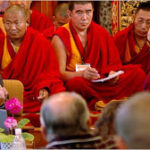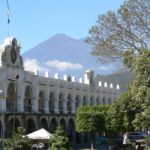A journalist for the London newspaper ‘The Independent’ describes the threatening oppression against LGBT rights activists in El Salvador. Against all odds the rights work goes on, now acknowledged by Elton John and the media.
Also see:
Gay El Salvador News & Reports 2005 to present
By David Usborne
22 March 2007
http://news.independent.co.uk/world/americas/article2381063.ece
Voice for homosexuals: A hero in the fight for gay rights
Despite a number of death threats, the efforts of William Hernandez, praised by Sir Elton John for speaking up for gays and lesbians, are finally being recognised.
When William Hernandez sees countries as varied as Britain, the United States and South Africa taking steps towards equal rights for homosexuals, he can be excused for feeling mixed emotions.
Last week, the revolution came even to the neighbours of his own country, El Salvador, when Mexico City splashily boasted its first civil union between two men.
Mr Hernandez celebrates because those changes have been driven by people exactly like himself – activists fighting to raise awareness of the plight of gay, lesbian and transgender members of society and agitating for political reform. But he weeps also, because he knows that while the struggle is scoring victories in some corners of the world, in too many others, the road to equality remains daunting and often dangerous.
Indeed, Mr Hernandez, 36, may know that better than almost anyone. As head of a gay and lesbian organisation in El Salvador called the Asociacion Entre Amigos – the Among Friends Association – he has made himself a target not just of harassment and pressure by what he believes are agents of the police, the government and Christian groups but also of repeated death threats. The most recent incident came one summer day last year. "I will kill you before you get married," the gunman whispered.
But if the outlook for gay rights in El Salvador remains bleak – with legislation afoot in congress specifically to outlaw gay marriage though a constitutional amendment – Mr Hernandez is at least increasingly winning the attention of his brethren activists abroad. For better or worse, he is the new poster boy of a global movement to expand gay rights and to pressure those countries that remain hostile and repressive.
The gay rights wing of Amnesty International last year selected him for its Greetings Card Campaign, which urges people to send messages of support to 25 people around the world who are victims of torture and other human rights abuses. "Sending a card is a simple yet effective way of offering a great sense of hope and solidarity to William and his colleagues," Amnesty exhorts. "It also sends a message to the authorities in El Salvador that people around the world care about the staff at this organisation."
Elton John Brings Light and Attention
If that kind of attention can help, then yesterday brought new and quite unexpected tidings for Mr Hernandez and from a surprising quarter: Sir Elton John.
In a column for the next issue of New Statesman magazine, Sir Elton pays tribute to gays and lesbians in other lands taking far greater risks than ever did to push the boundaries of tolerance. And he to singled out Mr Hernandez for his courage.
" I want to shine a spotlight on William Hernandez and the many, many individuals who stand up for human rights around the world, at great risk to their personal safety," Sir Elton writes, while noting the joy of his own recent marriage to his long-time partner. "People like William are a lot braver than me. When the bigots shout abuse, these people shout back. My voice has served me pretty well over the years; I hope maybe it can do him some good too. But we need more voices. Whether the bigot is in our local pub or 1,000 miles away, we should all stand up and speak out for these basic human rights."
By yesterday, the article by Sir Elton was already circulating like a piece of samizdat among Mr Hernandez’s friends in the city of San Salvador. Speaking by telephone from San Salvador, Mr Hernandez was excited over its appearance but agreed it might stir trouble. "This is certainly going to cause controversy and put us in the centre of a hurricane," he said. "But it will also help draw the attention of the international community to our work and so this is a cost that we are ready to assume, of course."
That Mr Hernandez is brave is not in doubt. He admitted yesterday he can no longer move around his city without bodyguards. As a much younger man, he followed the rites of society in El Salvador and married a woman. They had twin girls who today are 19 years old and with whom he remains in touch. It was not long, however, before he understood his true sexuality.
" I’m gay/bisexual, and I realised that when I was 24, after years of sexual abuse by a priest in the Catholic Church named Father Luis Recinos Lopez," he recently told a reporter for Gay City News, a newspaper in New York.
He kept his sexuality to himself for many years until something happened in his personal life that persuaded him to become active. "I realised that my partner of 14 years was HIV-positive because there were so many lies around the disease. So I decided to educate to prevent the spread of HIV/Aids and the phobia that goes with it".
Coming out, a risky proposition in El Salvador, followed quickly. "I came out in public when I was giving an interview to the local TV station, it wasn’t premeditated, I hardly realised what I was doing."
Summit of Latin American Gay Rights, 2007
Last week, Mr Hernandez attended a summit of Latin American gay rights organisations (Conga) in Guatemala where attendees voiced concern about gay repression in El Salvador and the rising numbers of murders of gay and bisexuals. According to Mr Hernandez as many as 45 gay or bisexual men have been murdered in his country in the past eight years. Especially vulnerable are the transsexuals and transvestites whose lifestyle makes them stand out. Often they are victims of gangs who ask new members to prove themselves by committing one murder – the gay population are easy prey.
With each killing and each assault, the frustration of Mr Hernandez only mounts. Reporting them to the authorities is more or less futile, he explains. If they try, in most cases, officials will not even take the time to write down details of the case and create a record. He recalls an incident late last year when three detectives of the national police allegedly pursued four transgendered youths and beat them. One man was arrested, according to Mr Hernandez, and beaten so badly he was admitted to hospital. The other three tried to file an official complaint with the police with help from Entre Amigos and were rebuffed.
The pressure on him and his organisation grew suddenly last summer when he took up the cause of opposing the proposed amendment in congress to ban gay marriage. In late May, the office of Entre Amigos was broken into and ransacked. Papers and other records were stolen and two messages were left on pieces of paper left behind. "Fags die," read one, while other added: "This is what you deserve".
It was a day later when he was held up as he was leaving work – just after the police officer who had been posted to protect him had left for the day. Before grabbing his briefcase and running away, the assailant put a gun to his neck from behind and gave him this warning: "Don’t turn around. Stop fucking in the Assembly. Stop doing stupid things in the street because I know you are organising some shit for this month. I already looked inside but didn’t find anything. Here I’ll find what I’m looking for. Stop fucking or I’ll kill you before you get married."
Mr Hernandez is in little doubt that the break-in and the hold-up were connected, orchestrated by "members of the national police and other local government agents".
The incidents were also debated at the conference in Guatemala, where Mr Hernandez told delegates that El Salvador’s Attorney General still has said nothing about the break-in of his office, which happened, he said, "because of our opposition to the constitutional amendment… to prohibit same-sex marriage."
Lamenting the judiciary’s apparent indifference to what happened, he added yesterday: "We have had to change offices and there has been no progress at all in the investigation."
Mr Hernandez has publicly accused a congressman from the opposition Christian Democratic Party, Robert Parker, who is the main champion of the amendment proposal, of fomenting new violence against homosexuals.
He has also laid blame on the Catholic Church, noting that the Bishop of El Salvador, Monsignor Saenz Lacalle, has referred to gay people as "sick" and "perverted". He claims that the Catholic charity Caritas has a policy of not extending a hand of help to anyone in El Salvador who is homosexual.
If the influence of the Church is important, all the more surprising that Mexico City has carried the torch by allowing gays to tie the knot.
To that, Mr Hernandez shows enthusiasm and caution. He notes the law, restricted to the capital region, stops short of fully fledged marriage. "It is inspiring what has happened in Mexico, but we can’t perpetuate a second-class status for members of our community."
















